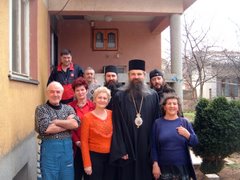Church Saids UN Envoys are Bias
Church say UN envoys for Kosovo biased against Serbs
August 28, 2006 1:57 PM
BELGRADE, Serbia-The Serbian Orthodox Church on Monday accused the United Nations' top two envoys for Kosovo of siding with Kosovo's ethnic Albanians in negotiations over the province's future status.
The church, which wields considerable influence among Serbs, sharply criticized Joachim Ruecker, Kosovo's U.N. administrator, and Martti Ahtisaari, the U.N.'s chief envoy, saying they "have openly declared their pro-Albanian stances."
They "have joined a media campaign for (Kosovo) Albanian interests and wishes. Their recent statements have triggered surprise, worry and bitterness among the Serbian people," it said in a statement.
Later Monday, the Serbian government also accused Ahtisaari of bias, and said it is "taking diplomatic and other steps to resolve the situation over his statements, without jeopardizing the negotiation process." It did not elaborate.
The statements are the latest in a series of recent Serb criticism of U.N. officials, particularly veteran diplomat Ahtisaari, for comments he made on the legacy of the Milosevic regime.
"While today's democratic regime in Belgrade cannot be held responsible for the policies and actions of the Milosevic regime, leaders in Belgrade must come to terms with its legacy and have important responsibilities in this sense," Ahtisaari said last week.
"The historic legacy cannot simply be ignored, but must be taken into account in a search for a solution of the status question," he said in comments that enraged many Serbs.
U.N. officials in Kosovo refused Monday to respond to the allegations. "We do not comment on comments," said Remi Dourlot, a spokesman for Ahtisaari's office.
Gyorgy Kakuk, the spokesman for the U.N.'s mission in Kosovo, also refused to comment.
The U.N.-brokered negotiations on Kosovo's future status began earlier this year, with international mediators hoping to complete the process by the end of the year.
Ruecker, a German diplomat, was recently quoted saying he thought Kosovo would one day be an independent state.
Kosovo's ethnic Albanians, who are predominantly Muslim, want independence for the province while its Serbs, who are mostly Christian Orthodox, insist that the region, which they consider the cradle of their statehood and religion, remain part of Serbia.
The U.N. has administered Kosovo and NATO has guarded it since a 1999 NATO air war to halt the Serb crackdown on ethnic Albanian separatists, leaving Serbia with no authority over the region.
Kosovo's future status remains the last outstanding issue from the violent breakup of former Yugoslavia in the 1990s.



